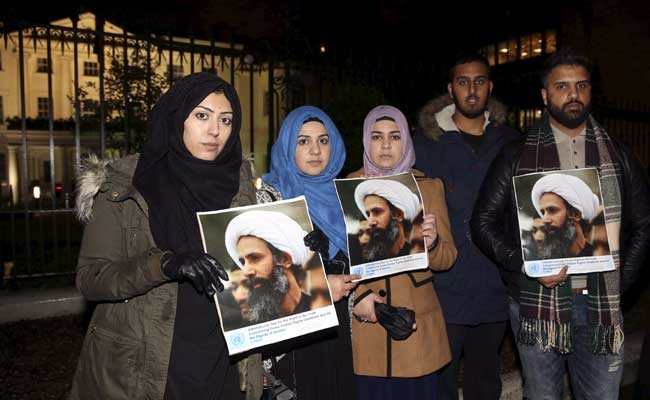
- Protesters holding pictures of Shi’ite cleric Sheikh Nimr al-Nimr are pushed back by Iranian riot police during a demonstration against the execution of Nimr in Saudi Arabia, outside the Saudi Arabian Embassy in Tehran January, 3, 2016. REUTERS/Raheb Homavandi/TIMA
Iranian protesters stormed the Saudi embassy in Tehran early on Sunday and Shi’ite Muslim Iran’s top leader predicted “divine vengeance” for Saudi Arabia’s execution of a prominent Shi’ite cleric.
Strong rhetoric from Tehran was matched by Iran’s Shi’ite allies across the region, with Sayyed Hassan Nasrallah, the head of Lebanese militia Hezbollah, describing the execution as “a message of blood”. Moqtada al-Sadr, an Iraqi Shi’ite cleric, called for angry protests.
Tensions between revolutionary, mainly Shi’ite Iran and Saudi Arabia’s conservative Sunni monarchy had already run high for years as they backed opposing forces in wars and political conflicts across the Middle East, usually along sectarian lines.
However, Saturday’s execution of a cleric whose death Iran had warned would “cost Saudi Arabia dearly”, and the storming of the kingdom’s Tehran embassy, raised the pitch of that rivalry.
Demonstrators protesting against the execution of Sheikh Nimr al-Nimr broke into the embassy building, smashed furniture and started fires before being ejected by police.
Iran’s President Hassan Rouhani condemned the execution as “inhuman”, but also urged the prosecution of “extremist individuals” for attacking the embassy and the Saudi consulate in the northeastern city of Mashhad, state media reported.
Tehran’s police chief said an unspecified number of “unruly elements” were arrested for attacking the embassy with petrol bombs and rocks. A prosecutor said 40 people were held.
“The unjustly spilled blood of this oppressed martyr will no doubt soon show its effect and divine vengeance will befall Saudi politicians,” Iran’s Supreme Leader Ayatollah Ali Khamenei was quoted as saying by Iran’s state television.
Iran’s Revolutionary Guards had promised “harsh revenge” against the Saudi Sunni royal dynasty for the execution of Nimr, considered a terrorist by Riyadh but hailed in Iran as a hero of the rights of Saudi Arabia’s marginalized Shi’ite minority.
However the Saudi and Iranian foreign ministers told Austria they have no interest in a further of heightening tensions between them, a spokesman for Austria’s Foreign Minister Sebastian Kurz said.
› Saudi mass execution driven by fear of Sunni militancy
› EU warns new Mideast tension risks Syria peace effort
› Saudi Arabia, Iran say have no interest in escalation: Austria
PROTESTS
Nimr, the most vocal critic of the dynasty among the Shi’ite minority, had come to be seen as a leader of the sect’s younger activists, who had tired of the failure of older, more measured leaders to achieve equality with Sunnis.
His execution sparked angry protests in the Qatif region in eastern Saudi Arabia, where demonstrators denounced the ruling Al Saud dynasty, and in the nearby Gulf kingdom of Bahrain.
Relatives of Nimr, reached by telephone, said authorities have informed them that the body had been buried “in a cemetery of Muslims” and would not be handed over to the family.
Although most of the 47 men killed in the kingdom’s biggest mass execution for decades were Sunnis convicted of al Qaeda attacks in Saudi Arabia a decade ago, it was Nimr and three other Shi’ites, all accused of involvement in shooting police, who attracted most attention in the region and beyond.
















